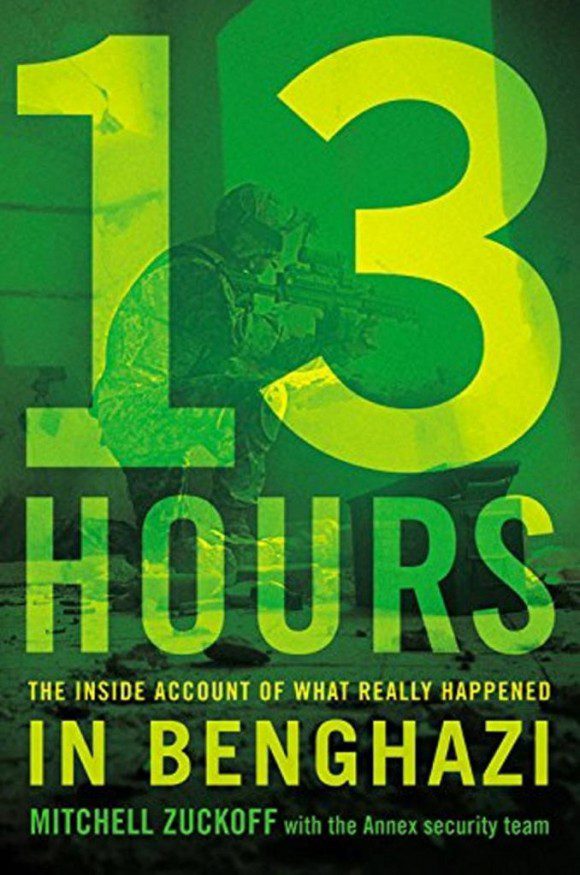
The attack on the US Consulate in Benghazi will go down in history as a terrible tragedy. Not only was a United States Ambassador murdered, but three other Americans also lost their lives in the attack. After the fact, we know that Ambassador Stephens had made a number of requests for more security for the American diplomats working in Libya. Those requests were ignored by the State Department.
The story contained in 13 Hours: The Inside Account of What Really Happened In Benghaziand the movie by the same name does not focus on the politics of the Benghazi attack. Of course, they are mentioned. The lies and coverup that the Obama Administration engaged in to shift the blame cannot be ignored.
Rather than focusing on the politics, though, the book and movie focus on the six men who stepped into harm’s way to save American lives. It is a story of courage, teamwork, and sacrifice. Both the book and the movie are action packed. The surviving members of the GRS Security team are co-authors of the book.
The CIA employs former special forces personnel to provide security for its agents in the field. Known as the Global Response Staff, these military contractors serve in dangerous countries like Libya to protect CIA agents. When the US Consulate in Benghazi was attacked in September 11 2012, it was six of these contractors that stepped into the fight.
The six GRS personnel had varied military backgrounds but all were special forces and all had seen previous combat. Three of the men had been Marines, two had been Navy Seals, and the other was an Army Ranger. The CIA compound was about a mile from the consulate. It was supposed to be a secret location but it seems that most of the locals knew what the location was.
When the consulate was attacked, it was not immediately clear how bad it was. Within minutes, however, the GRS contractors could hear the gunshots and explosions from their compound. The few State Department security personnel assigned to the Ambassador started calling for help over the radio. One of the GRS men was out with a CIA officer on a meeting. The other five immediately began loading their weapons and strapping on their equipment.
They rushed out to their vehicles but were stopped by “Bob,” the CIA Station Chief. He was their immediate boss and he told the operators that they were not authorized to intervene. Since they worked for the CIA and not the State Department, their involvement would give away their presence in Benghazi. He said he was trying to get Libyan forces to respond.
The radio calls continued to come in, asking and then begging for help. A large group of armed men were setting fire to the buildings and vehicles in the consulate and shooting their AK-47s at anything that moved. The ambassador, a civilian IT, and a State Department bodyguard all tried to hide in a reinforced safe-room.
The GRS Operators were seething. They wanted to get in the fight. This what they had spent their entire adult lives doing and now they were being told to standby and trust that the Libyan security forces were going to come to the rescue. The CIA Station Chief continued to tell the operators that they could not leave the annex. After 45 minutes, however, the five GRS personnel, a CIA operative, and a translator had heard enough of the radio traffic. “If you guys do not get here, we are going to die!” The team left the annex and headed for the consulate with Bob telling them to “Stand down!”
The team was able to rescue several Americans at the consulate. Sadly, they were unable to locate Ambassador Stevens. The villa he was hiding in was set on fire. A number of the warriors braved the fire in an effort to locate him. They did recover the body of Sean Smith, the State Department communications expert. Somehow during the rescue attempt, he had become separated from the others and died of smoke inhalation.
The GRS personnel’s goal was to secure the Americans and take them back to the annex. The terrorists had fled by the team the calvary got to the consulate. After several more tries of trying to find the ambassador, the team got the news that the terrorists were massing for another attack. The team loaded up and fled back to the CIA annex.
As if the night had not been bad enough, the annex soon came under attack by a group of terrorists armed with AK-47s and RPGs (rocket propelled grenades). Perhaps the terrorists anticipated another easy target that they would walk right through. Instead, they met the combined firepower of the six GRS personnel, a couple of CIA operatives, and two State Department security officers.
A number of the terrorists were shot before the rest fled. Several more times during the night, the attackers tried to fight their way into the annex. Every time, the American operators made them pay with their lives.
After paying a terrible price, the attackers tried something new. They began to rain down mortar rounds on the CIA Annex. One of the buildings took a direct hit. Two of the GRS warriors were killed, Tyrone Woods and Glen Dougherty. They were both former Navy Seals. Other Americans were wounded during the mortar attack but dawn was coming.
Eventually, Libyan Security Forces did show up to assist the Americans. The body of Ambassador Stevens was recovered and he, too, had died from smoke inhalation. The Libyans provided an escort to the airport where an airplane was waiting to take the Americans away.
There is much more to this story and I encourage you to read the book and watch the movie. Could Ambassador Stevens and Sean Smith’s lives had been saved by a quicker response? We will never know but it seems likely. The GRS team did account for a total of over twenty people that were rescued from the consulate and those CIA personnel that were at the annex. No one contests the assertion that without the six GRS warriors the body count of Americans would have been much higher.
My wife, Annie, and I are serving the Lord in Brazil. We are training leaders and helping plant churches. Would you join our team? Just click here to get involved. Obrigado!

